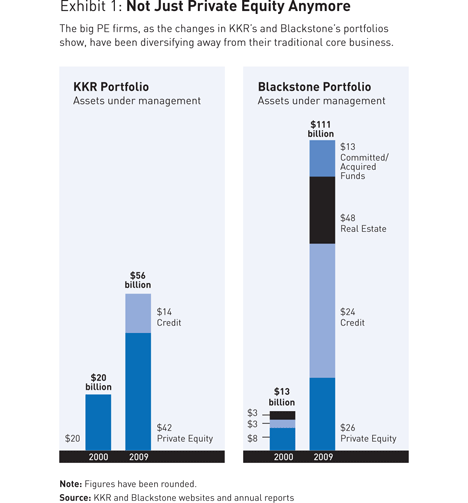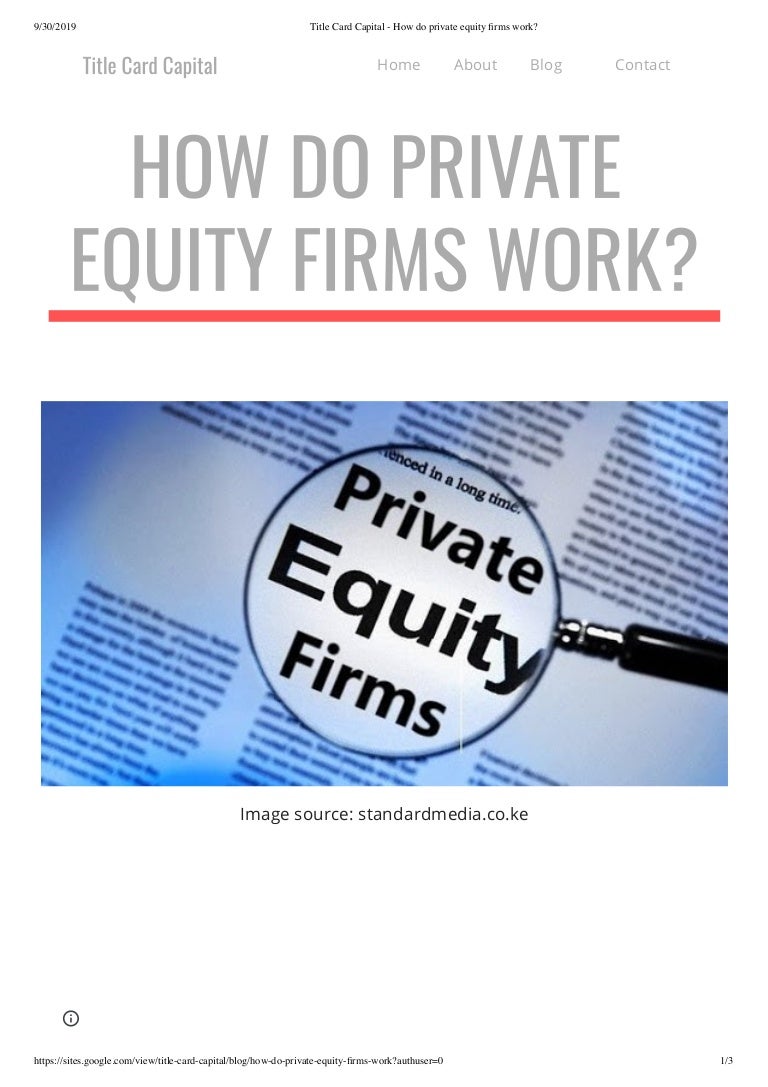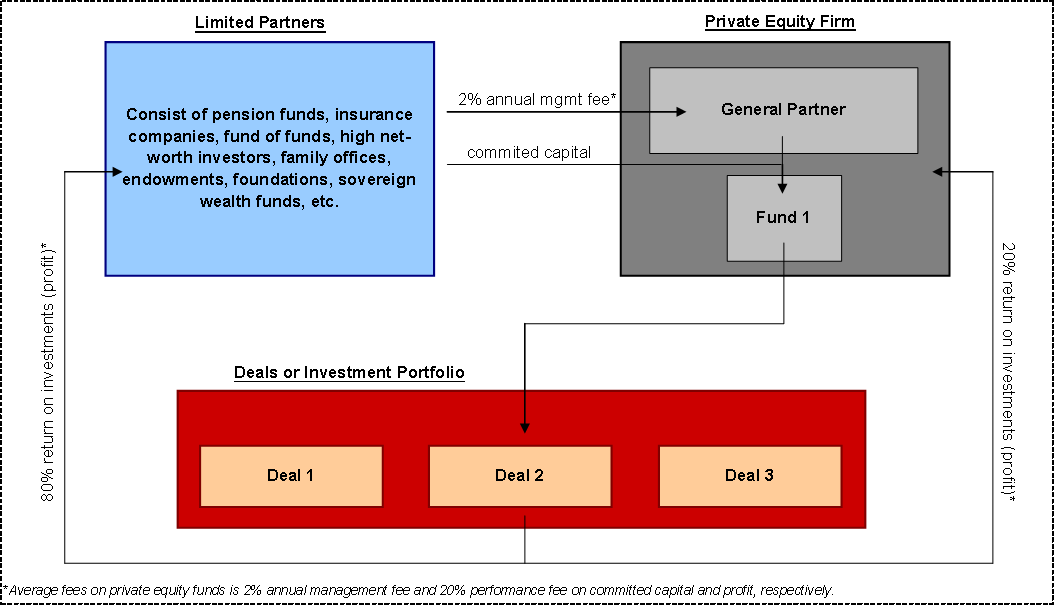
What you do not want is using extreme amounts of financial obligation, which is truly what puts business at high threat for insolvency. My second, I guess I’m torn in between more transparency so that we understand more about what these private equity funds are doing, and an ensured severance for workers.
What typically takes place is private equity is available in and loads a portfolio business up with debt. Somehow the portfolio company now needs to get the cashflow up so that it can now make the debt payments. And the easiest way to do that is to cut employee hours, employment, or benefits. Please note: Although this chart might imply otherwise, IPOs are not the peak of all (or even most) businesses. Numerous organisations will begin, grow, and pass away with private capital. Not all private equity is equivalent. There are countless private equity companies in the United States varying in size. CapIQ, the finance industry’s top database for market intelligence, reports 2666 private equity companies in the United States.
The chart listed below display screens the information. The chart reveals the wide array of private equity firms throughout the country. There are 279 firms with funds over $1B, 346 companies with funds less than $50M, and 1171 in between. At the leading end, there are the industry giants of KKR, Blackstone, Carlyle, and so on. loans athletes sports.

These are the deals you check out in the paper. Although they are a minority of private equity deals, they get most of journalism. At the lower end, there are private equity companies that invest $1-2 million in privately-held businesses. Your preferred coffee roaster or the regional factory could be private equity-controlled.
The 6 Things A Private Equity Firm Will Do After They Buy
Numerous companies will only think about companies that operate in a particular sector or geographical place. What’s the distinction in between private equity-owned and private equity-controlled? A private equity firm is seldom the sole owner of a company but is generally the bulk owner. Private equity firms usually control 60-80% of a service.

Although these organisations are frequently described as “private equity-owned” they could more precisely be considered “private equity-controlled.” Private equity companies raise funds of capital that invest in business. The capital in the funds originate from Limited Partners (LPs) and General Partners (GP). About 90% of a fund’s capital comes from LPs.
Examples of LPs are insurance provider, trusts and endowments, pension funds, high net worth people, and banks. They are not associated with the fund daily. It is just an investment lorry for their capital (grant carter obtained). GPs are people who run the fund as their day task. Many GPs have histories as bankers, accounting professionals, or portfolio supervisors.
The capital in the fund is utilized to purchase business. When those companies are sold the profit is dispersed between the LPs and GPs. LPs typically get 80% of the favored return (if any). GPs get around 20% of the capital gains (if any). They also earn a management cost on the fund’s capital 2% is standard.
The Ultimate Guide To Private Equity – The Dvs Group

They evaluate a big number of deals however a very little percentage gets closed. Many private equity firms have multiple funds of capital. Each fund follows a timeline comparable to this: The very first couple years is invested raising the capital that will develop the fund. As fundraising finishes up, GPs work with their offer sources to discover companies they are interested in purchasing.
When the GP sees that an exit can produce a rate of return that would satisfy or go beyond the LPs expectations, they will offer business. Many funds have a 10-year life cycle. Although, that has actually been changing in recent years with some funds choosing life cycles better to 15 or 20 years.

These funds run on various timelines. tysdal lone tree. A private equity firm can be raising cash for one fund while exiting a service to make a return on a different fund as can be seen in the chart below. Simply as each fund has a basic life cycle, private equity firms follow a basic cycle for each business they buy.

Particular funds can have their own timelines, investment objectives, and management approaches that separate them from other funds held within the same, overarching management firm. Effective private equity firms will raise numerous funds over their lifetime, and as companies grow in size and complexity, their funds can grow in frequency, scale and even uniqueness. For more information about portfolio managers and - research his blogs and -.
Prior to establishing Freedom Factory, Tyler Tysdal handled a growth equity fund in association with a number of celebrities in sports and entertainment. Portfolio company Leesa.com grew rapidly to over $100 million in earnings and has a visionary social mission to “end bedlessness” by contributing one mattress for every single ten offered, with over 35,000 donations now made. Some other portfolio business were in the industries of wine importing, specialty lending and software-as-services digital signs. In parallel to managing possessions for companies, Tysdal was managing private equity in real estate. He has had a number of effective personal equity financial investments and several exits in trainee real estate, multi-unit housing, and hotels in Manhattan and Seattle.
When the company has grown to a point where the fund will make an acceptable rate of return on the sale, the firm will sell their stake in business. business partner grant. What is a” Buy & Hold” strategy?Some private equity firms will mention that they have a “purchase & hold” technique. This suggests that the companies do not buy organisations with a particular exit timeline in mind they will own business for an undetermined amount of time.
Where Private Equity Firms Come Into Play?
There are 5 boxes that need to be checked for every investment a private equity firm makes. With really couple of exceptions, a company must have these things for a private equity firm to be interested: Self-Sufficient Management Team Minimum $3M EBITDA Positive Capital Defensible Market Position Practical Exit Strategy Remember private equity firms are simply money managers.
Private equity companies may think about smaller business as add-on’s. What’s the difference between platform and add-on acquisitions? Platform acquisitions are typically investments in big business poised for development. Platform companies are typically the first major financial investment for a private equity fund. Add-on acquisitions are investments made after a platform is established – partner grant carter.
In our work with private equity firms we have seen that an appealing incentive in getting an offer done is seller involvement in the capital structure of business going forward. This often takes the kind of seller funding and/or roll-over equity. Private equity firms find these alternatives attractive since they permit the seller’s expertise to still be included in business’ operations.
This chart reveals a standard private equity deal structure: Many company purchasers, private equity funds especially, use debt even if they do not require to. Here’s why: debt increases the fund’s rate of return. Since of that, debt is a lot more influential to private equity offers than many people understand. This chart lays out a basic scenario as an example (impact opportunities fund).
Private Equity Firms Start To Outline Pandemic Impact In Form …
Each year after the acquisition, the financial obligation part of the firm’s ownership decreases and the equity portion boosts. In this situation the company’s appraisal has actually stayed consistent at $4,000 (although, companies normally do grow after five years). That implies that the firm will get $4,000 on the sale of the business.

This is since they selected to utilize debt when they made the acquisition – investors state prosecutors. As time went on, financial obligation diminished, and equity grew. Without financial obligation, the firm would not have had such a strong rate of return. Even if you think private equity will never touch the ownership of your company, it matters due to the fact that You remain in competitors with private equity-controlled businesses.




 Stephen Wilcox …
News journalists can work up to 50 hours per week, especially when just starting out and trying to build up a portfolio and contacts. The hours can be unsociable, you have to be geographically flexible and journalists have to work under pressure to tight deadlines. In other words: it’s hard graft.
There is no one fixed path to making it in the media. Journalists have diverse backgrounds and you can enter the
Stephen Wilcox …
News journalists can work up to 50 hours per week, especially when just starting out and trying to build up a portfolio and contacts. The hours can be unsociable, you have to be geographically flexible and journalists have to work under pressure to tight deadlines. In other words: it’s hard graft.
There is no one fixed path to making it in the media. Journalists have diverse backgrounds and you can enter the  How to Become a Journalist
There are lots of Masters Courses available where you can basically learn everything you need to be a journalist crammed into a year (or two years if you do it part-time). Some of these courses are also accredited by relevant institutions – such as the National Council for the Training of Journalists.
How to Become a Journalist
There are lots of Masters Courses available where you can basically learn everything you need to be a journalist crammed into a year (or two years if you do it part-time). Some of these courses are also accredited by relevant institutions – such as the National Council for the Training of Journalists.
 How to Become a Fashion Journalist: 13 …
Similarly, News Associates (who have offices in both London and Manchester) offer a 20-week long NCTJ fast-track Multimedia Journalism Diploma. The advantage of these courses is that you can learn everything you need to know to be a journalist – editing, writing, reporting, media law, ethics etc. – all crammed into a few weeks.
These courses are probably better suited for people who already have broad experience in the industry and are looking to sharpen their skills and get a professional qualification. “If you don’t buy a ticket, you’ll never win the lottery” is an overused phrase but it does hold some validity in journalism.
How to Become a Fashion Journalist: 13 …
Similarly, News Associates (who have offices in both London and Manchester) offer a 20-week long NCTJ fast-track Multimedia Journalism Diploma. The advantage of these courses is that you can learn everything you need to know to be a journalist – editing, writing, reporting, media law, ethics etc. – all crammed into a few weeks.
These courses are probably better suited for people who already have broad experience in the industry and are looking to sharpen their skills and get a professional qualification. “If you don’t buy a ticket, you’ll never win the lottery” is an overused phrase but it does hold some validity in journalism.
 Rules to help you become a journalist …
Broadcast translators, for example, can make anything between £30,000 and £60,000 in senior positions. Working hours tend to be unsociable as most journalists are required to work long hours. As research is a huge aspect of a reporter’s work, most tend to work outside the office searching for leads. Most people believe that all it takes to become a journalist is to be able to write wittily, or speak eloquently, but it takes a lot more than that. Visit
Rules to help you become a journalist …
Broadcast translators, for example, can make anything between £30,000 and £60,000 in senior positions. Working hours tend to be unsociable as most journalists are required to work long hours. As research is a huge aspect of a reporter’s work, most tend to work outside the office searching for leads. Most people believe that all it takes to become a journalist is to be able to write wittily, or speak eloquently, but it takes a lot more than that. Visit